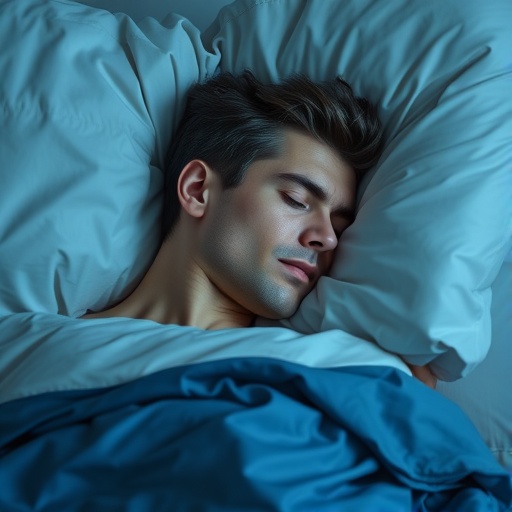In an era where the demands of modern life leave many sacrificing their sleep, new insights into the relationship between sleep deprivation and cognitive performance have emerged. A groundbreaking study led by renowned researchers, including H.A. Uyhelji, S.J. Nicholson, and T.E. Nesthus, highlights the urgent need for biomarkers that assess the impact of sleep loss on neurobehavioral performance. As the study emphasizes, understanding these biomarkers could significantly enhance our ability to mitigate the cognitive impairments associated with insufficient sleep.
The research presented in this study is particularly relevant given the increasing prevalence of sleep disorders and the societal acceptance of sleep deprivation. With many individuals routinely experiencing insufficient sleep due to work, lifestyle choices, or personal circumstances, the consequences for cognitive function and overall health are becoming increasingly concerning. This study does not simply address the symptoms of sleep loss but delves into the underlying mechanisms that contribute to performance impairment, proposing a comprehensive approach to address this urgent public health issue.
At the core of this exploration lies the concept of biomarkers — measurable indicators that provide insight into physiological processes. The researchers aim to identify specific biomarkers that correlate with neurobehavioral performance, particularly under various types of sleep deprivation. These biomarkers could range from molecular signatures detectable in blood or saliva to genetic variations that predispose individuals to different responses to sleep loss. The implications of successfully identifying these biomarkers could reshape our understanding of sleep science entirely.
Utilizing both experimental and observational methodologies, the study contrasts neurobehavioral performance across multiple types of sleep deprivation. By conducting a series of controlled experiments, the researchers measured cognitive function through tasks that are known to be sensitive to sleep loss, such as reaction time tests, memory recall exercises, and attention span evaluations. Each of these tasks provides a window into how the brain copes with deficits in restorative sleep, revealing nuanced patterns that may serve as the basis for developing reliable biomarkers.
The results of these experiments indicate that the effects of sleep deprivation are not uniform; rather, they vary significantly based on the type and duration of sleep loss experienced. Some individuals exhibit marked decrements in cognitive performance after just a few hours of sleep deprivation, while others appear to tolerate similar conditions with little immediate cognitive impact. This variability raises essential questions about the biological and genetic factors that influence sleep resilience, suggesting that not all individuals are equally affected by sleep loss.
Moreover, the study establishes a critical relationship between the patterns of sleep loss and specific cognitive deficits. For example, prolonged periods of total sleep deprivation were shown to be particularly detrimental to tasks requiring executive function, while shorter bouts of sleep restriction more severely impacted attention and alertness. These findings illuminate the complex interplay between the brain’s needs for restorative sleep and the toll that deprivation takes on cognitive performance.
One of the most compelling aspects of this research is the potential application of identified biomarkers in real-world settings. As organizations increasingly prioritize employee well-being, understanding how sleep deprivation affects performance could transform workplace practices. Accurate biomarkers could pave the way for implementing individualized sleep health interventions, such as personalized recommendations for sleep duration based on cognitive performance assessments.
Additionally, the implications of this research extend beyond occupational health; they touch on broader societal issues, including road safety and public health. The cognitive impairments resulting from sleep deprivation not only affect individual performance but collectively pose risks to society, as drowsy driving remains a leading cause of traffic accidents. By quantifying the impairments that arise from different sleep deprivation scenarios, this research could inform policy changes aimed at reducing sleep-related incidents.
The potential for these findings to inspire new treatments and interventions is enormous. With the growing focus on mental health and wellness, developing strategies that address sleep health through the lens of neurobehavioral performance could yield significant benefits. This shift from traditional public health messaging about sleep to more nuanced, individual-focused interventions marks a new frontier in sleep science.
As we continue to navigate the complexities of life in the fast lane, the importance of understanding the ramifications of insufficient sleep cannot be overstated. The potential for biomarker development to enhance our capability to predict cognitive decline due to sleep deprivation stands at the forefront of this research. Each advancement in understanding could offer vital clues to help individuals reclaim their cognitive vitality.
In conclusion, the groundbreaking study spearheaded by Uyhelji and colleagues sheds light on a critical intersection of sleep research, neurobehavioral science, and public health. The identification and application of biomarkers for sleep deprivation could not only revolutionize how we approach individual sleep health but also equip society with essential tools to combat the widespread effects of sleep loss.
As we await the further developments of these findings, the imperative for a cultural shift towards prioritizing sleep and understanding its impact on our cognitive functioning remains paramount. Further research will undoubtedly uncover additional dimensions of this complex relationship, potentially reshaping policies, workplace practices, and individual health strategies for the years to come.
Subject of Research: Development of biomarkers for neurobehavioral performance impairment related to sleep loss.
Article Title: Exploratory development of biomarkers for neurobehavioral performance impairment during sleep loss: comparison across multiple types of sleep deprivation.
Article References:
Uyhelji, H.A., Nicholson, S.J., Nesthus, T.E. et al. Exploratory development of biomarkers for neurobehavioral performance impairment during sleep loss: comparison across multiple types of sleep deprivation. BMC Genomics 26, 1043 (2025). https://doi.org/10.1186/s12864-025-12193-6
Image Credits: AI Generated
DOI: https://doi.org/10.1186/s12864-025-12193-6
Keywords: Sleep deprivation, neurobehavioral performance, biomarkers, cognitive function, public health, workplace wellness, mental health, personal sleep health interventions.




